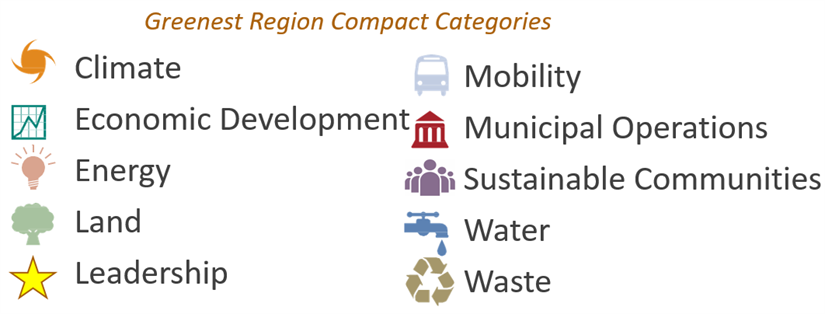On Dec. 6, mayors from across the U.S. visited MPC to discuss the role of municipalities in a global climate change movement

MPC
Park Forest Mayor John Ostenburg calling for leadership to tackle climate change
Cities are now known as the new faces of American leadership on climate change. Last week, right here in Chicago, mayors from 51 cities across 10 nations crystalized their commitment to concrete local action in a global climate movement by signing the Chicago Climate Charter at the North American Climate Summit on Dec. 4-5.
In conjunction with the convening, more than 30 metro Chicago municipal leaders gathered on Dec. 6 for a conversation about effective municipal climate action organized by MPC and the Metropolitan Mayors Caucus.
Mayors and managers from Hazel Crest to Wheeling were joined by seven out-of-town North American mayors who attended the Summit to share new ideas over breakfast and unite their voice of local action responding to a changing climate.
It’s about linkages and lateral leadership
“By including climate change" in our city's strategic plan, our city council "made a public declaration of support and intent on what we want our collective future to be." —Mayor Rick Bonnette, Halton Hills, Toronto, Canada
“Cities have the power, but when they link together their power becomes unstoppable” said Tom Weisner, MPC Senior Fellow and former Mayor of Aurora, Illinois, the second most populous city in the state.
As CityLab noted earlier this year, cities that act together—and across sectors—could reach their climate goals quicker and more economically. The example that CityLab noted was the role of private partners to help local governments finance projects with big upfront costs. That’s how Houston was able to convert 165,000 municipal bulbs to LEDs in 2014, cutting street light energy use by half and slashing municipal emissions by 5 percent.
Park Forest Mayor John Ostenburg spoke about lateral leadership, the non-hierarchical, bottom-up approach of coordinating and goal-setting “across the spectrum to create solutions” to the inevitable risks of climate change.
MPC believes that building municipalities’ capacity, networks, expertise and capabilities to efficiently coordinate can position our region toward implementing its local and regional goals around climate change and beyond.
Steal the best idea, and make it your own
Mayors are on the front line of tackling climate change because they drive concrete decisions that impact residents’ everyday quality of life.
There is a growing strength in numbers from municipal leaders near and far, united in a collective will to improve the quality of life for their residents and future generations by tackling climate change.
Mayors get excited about opportunities to hear new ideas and steal the best ones they can adapt for their communities. Knoxville Mayor Madeline Rogero detailed an exciting energy efficiency program, and inspired us all with the underlying notion of equity in sustainability that drives what local climate action looks like in her city.
The Knoxville Extreme Energy Makeover Program (KEEM) has provided comprehensive energy efficiency updates to more than 1,250 lower-income homes in Knoxville.
The results? Financial benefits to residents—approximately $450 savings per year for each family. Significant carbon dioxide emissions reductions that exceeded the program’s initial goal.
A major component of the program is citizen engagement and empowerment that can build community resilience. For example, KEEM partnered with a local community organization to support green career training for at-risk young adults.
Create a culture of sustainability
Halton Hills is a community of 61,000 residents in northwestern Toronto Area of Ontario, Canada with a deep commitment to sustainability. Mayor Rick Bonnette shared how establishing an ongoing community-wide conversation on sustainability, articulated in the city’s Strategic Action Plan, creates a culture of sustainability lived by citizens, businesses and government.

Metropolitan Mayors Caucus
The ten action categories of the Greenest Region Compact, a consensus-building framework for environmental sustainability
“By including climate change in the 2014-2018 Council Strategic Action Plan, Council not only made a public declaration of support and intent on what we want our collective future to be and what we can do to contribute to that vision, but it also provided our residents with a mechanism to hold Council accountable,” said Mayor Bonnette.
That commitment to the environment has attracted funding for Halton Hills to undertake an initiative that breaks new ground in municipal climate change adaptation planning. The municipality will receive federal funding to plan, build and maintain their infrastructure more strategically, enabling them to invest in projects that reduce greenhouse gas emissions and better prepare for the impacts of climate change.
We’re all in the same canoe… and we must leave the dock
In the metro Chicago region, more than 60 municipalities are already committing to accelerate a vibrant, sustainable future by adopting the Greenest Region Compact.
There is a growing strength in numbers from municipal leaders near and far, united in a collective will to improve the quality of life for their residents and future generations by tackling climate change.
In the metro Chicago region, more than 60 municipalities are already committing to accelerate a vibrant, sustainable future by adopting the Greenest Region Compact. Ranging from mobility and energy to water and climate, the Compact sets forth goals by communities to work in concert to become the greenest region in the United States.
Mayor of Honolulu, Kirk Caldwell put it this way: we’re all in the same canoe. All of us, all our cities, all our citizens deserve cleaner air, water, energy, transportation. It’s about saving the planet and protecting it for future generations. Record percentages of Americans are concerned about global warming, believe it is occurring and consider it a serious threat. We are all in this together.
For those communities lagging behind, municipal leaders uncertain of whether to make the required transitions, Mayor Caldwell declared the time is now to leave the dock. We must continue on the ‘Paris path’ and commit to taking action.
For the waters of the status quo are too dangerous.

MPC thanks ComEd for its generous sponsorship of this event